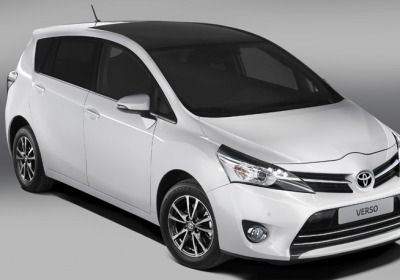Toyota Verso facelift (2012) first official pictures
Tue, 02 Oct 2012
Toyota's family friendly Verso MPV has gone under the knife, getting an Auris-style nose and better quality cabin as part of a mid-cycle facelift for the car. More than 300 parts have been changed on the revised Verso, and it'll be built exclusively in Turkey.
So what exactly is new on the 2012 Toyota Verso?The new face is clearly related to the latest Auris hatchback, which made its debut at the 2012 Paris motor show alongside the Verso. Slimmer headlights, a trapezoidal grille and LED running lights all try to evoke an air of poise and sportiness, but in truth the Verso isn't in the same dynamic league as a Ford S-max. Instead, the Japanese contender majors on interior flexibility and usefulness to woo its buyers.
Other visual tweaks are new alloy wheel designs, a 'diffuser' on the rear bumper (though Toyota is coy on any aerodynamic benefit) and smaller wing mirrors for less wind noise. So, on to that clever cabin...
Anything major new inside the Toyota Verso?It's a soft-touch smattering: more premium-feeling materials have been grafted onto the glovebox, and there's chrome highlighting around the air vents, instruments and door handles. Higher spec models get a leather steering wheel and armrest.
In a nod to the beating these MPVs take as family taxis, seat bolsters have been redesigned to be harder wearing. There are 32 different seating combinations, numerous cabin cubbyholes and a 440-litre boot (or 155 litres with all seats in place).
Any other Toyota Verso news?The 2.0-litre diesel motor has been revised for more torque and a 10g/km drop in CO2 output to 130g/km. Towing capacity for all diesel Versos has gone up by 200kg to 1500kg. Plus, extra welding points have stiffened the platform, which Toyota says makes the Verso more agile than before, and allowing the fitment of softer, more compliant suspension.
Prcies and full specification of the new 2012 Toyota Verso will be released later this year.
By Ollie Kew

